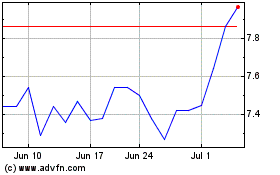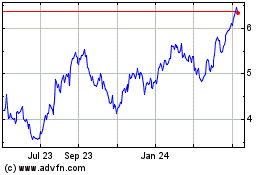Gazprom to Sell First Euro Debt Since Last Year -- Update
October 08 2015 - 3:07PM
Dow Jones News
By Christopher Whittall
Russian energy giant OAO Gazprom became the latest
emerging-market borrower to sell debt to international investors on
Thursday, taking advantage of growing expectation that the U.S.
Federal Reserve will delay raising interest rates.
Gazprom will pay an interest rate of 4.625% on a EUR1 billion
($1.12 billion), three-year bond, according to a deal notice
released today. Gazprom didn't respond to requests for comment.
The latest offering follows several bond deals from
emerging-market governments and companies this week as investors
backed the idea that the U.S. Federal Reserve might push back
raising interest rates following a weaker-than-expected jobs report
released Friday.
Turkcell Iletisim Hizmetleri AS, Turkey's biggest mobile-phone
operator, sold a 10-year, $500 million bond on Wednesday at an
interest rate of 5.75%. Ghana issued a 15-year, $1 billion bond at
an interest rate of 10.75% Wednesday. And Poland sold a six-year,
EUR1.75 billion bond at an interest rate of 0.875% on
Wednesday.
"These trades have really been driven by the benign interest
rate outlook in the U.S. after Friday's weak payroll numbers.
That's stimulated risk appetite, which has benefited
emerging-market borrowers, " said Stefan Weiler, a managing
director at J.P. Morgan Chase & Co.
Many economists believe emerging-market countries are vulnerable
to a rise in U.S. interest rates and a stronger dollar. Low
interest rates in the U.S. over the past several years encouraged
some investors to buy higher-yielding emerging-market assets.
Emerging-market debt has rallied since Friday's jobs report. The
extra yield investors demand to hold dollar-denominated
emerging-market sovereign debt narrowed to 4.10 percentage points
Wednesday, according to the J.P. Morgan Emerging-Market Bond Index
, from 4.37 percentage points last Friday.
Russian borrowers took advantage of the rally to return to
international bond markets after a lengthy absence.
Mining firm Norilsk Nickel broke a nine-month, dollar-bond
freeze for Russian companies when it issued a $1 billion bond on
Tuesday at an interest rate of 6.625%.
The average yield on Russian corporate and quasi-sovereign
corporate debt denominated in U.S. dollars rose to more than 13%
last December following a sharp fall in the price of oil, an
escalation of the conflict in Ukraine and the imposition of U.S.
and European sanctions against various Russian firms and
individuals. The average yield is now 6.3%, according to Barclays,
following a perceived easing of tensions in Ukraine. Yields rise as
prices fall.
International investors have again become comfortable with
holding Russian corporate bonds, which have performed strongly this
year, said Patrick Zweifel, chief economist at Pictet Asset
Management.
"As long as things haven't deteriorated in terms of sanctions,
we've reached a sort of a 'new normal' that investors are pretty
happy with," he said, adding that the interest payments investors
demand are high enough to compensate for the political risk
associated with holding this debt.
"Investors' perception of Russian risk has evolved over time,"
said Eric Cherpion, a managing director at Societe Generale, which
was one of several banks managing the recent Norilsk Nickel
deal.
"We got very strong investor feedback when we were on the road
with Norilsk; they considered the situation in Russia has
stabilized," he added.
Write to Christopher Whittall at
christopher.whittall@wsj.com
(END) Dow Jones Newswires
October 08, 2015 14:52 ET (18:52 GMT)
Copyright (c) 2015 Dow Jones & Company, Inc.
Turkcell lletism Hizmetl... (NYSE:TKC)
Historical Stock Chart
From Aug 2024 to Sep 2024

Turkcell lletism Hizmetl... (NYSE:TKC)
Historical Stock Chart
From Sep 2023 to Sep 2024
